Bluesfest calls time in 2025: has Australia fallen out of love with music festivals?
After more than 50 years in business, Byron Bay Bluesfest organisers have announced its 2025 event will be the last. Industry leaders weigh in on the uncertain future of Australia's festival scene.
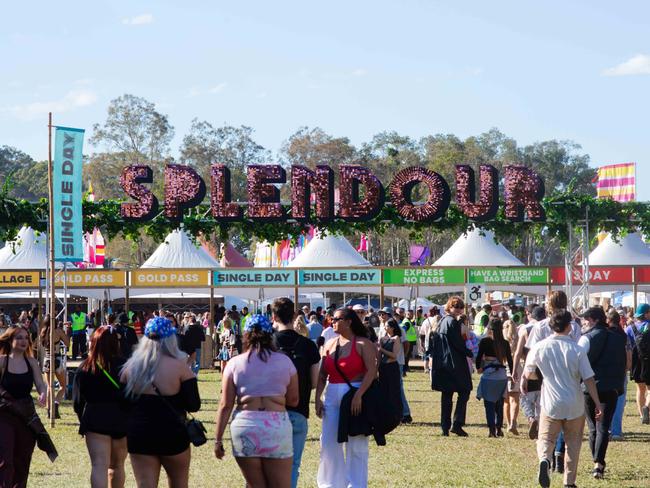
The Australian music festival scene is on life-support, with Splendour in the Grass just the latest in a long line of once-beloved major events forced to cancel.
The annual winter festival, held in Byron Bay, has been going since 2001 and has been a linchpin in the country’s festival line-up, but “unexpected events” saw organisers confirm on Wednesday that it would be taking a “year off”.
“We’re heartbroken to be missing a year especially after more than two decades in operation. This festival has always been a huge community effort, and we’d like to thank everyone for their support and overall faith. We hope to be back in the future,” Jessica Ducrou and Paul Piticco, co-CEOs of Secret Sounds, who produce the festival, said in a statement.
Just last month Groovin’ The Moo confirmed it too was cancelling its 2024 festivals, citing low ticket sales.
Last year, Falls Festival canned its 2023 shows to “rest, recover and recalibrate”, while FOMO, Stereosonic, Mountain Sounds, Future and Big Day Out have all been lost to the scene over the past decade.
The Australian has spoken to industry leaders, producers and major artists about the uncertain future of festivals and why so many are going under.
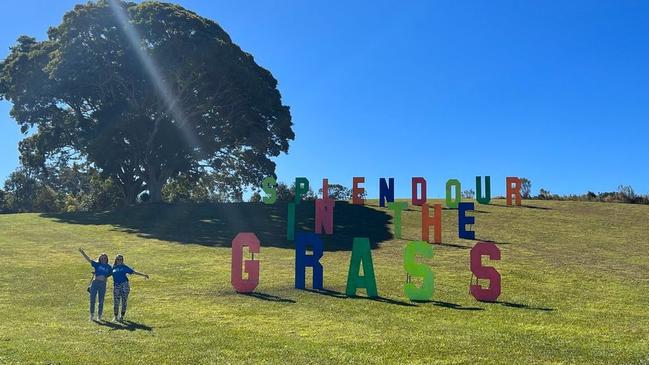
Cost of living
One industry insider told The Australian the explanation for disappearing festivals was simple, organisers are trying to sell an event to young people who can’t afford it.
“They’re pitching to uni students on hospitality wages,” he said, citing the economy in a cost of living crisis.
“If you look at festivals in Europe, Canada and the US, the line-ups are full of older bands to pull in the 30-40 crowds.
“Even Harvest and Fringe festivals in Australia are killing it and if you look at their line-ups they aim for cashed up, older demographics.”
The Australian Youth Barometer, a study commissioned by Monash University interviewing Australians aged between 18 and 24, found 90 per cent had experienced financial hardship in the past year.
The study revealed most young Australians felt they were suffering from “vastly different structural pressures” than other generations, while 43 per cent believed they were missing out on their youth as a result.
Rent, food and alcohol prices have all risen significantly, while wages remain flat.
Mitch Wilson, the managing director of the Australian Festival Association, said the industry’s issues were “purely economic”.
“It’s pandemic related and cost-of-living related,” he told The Australian.
“Lineups are also a factor. In Australia we’re seeing it be more difficult than elsewhere because the dollar isn’t strong and the higher costs of travel. The exchange rate of fees is lower and if travel is taken out of your fee, given the cost to fly a bunch of people from Europe or North America to Australia at the moment, it’s an unviable option.”
Matt Rule, the co-owner of Music and Booze co. and former stalwart of the Annandale Hotel, told The Australian festivals were becoming increasingly expensive to run and the costs were trickling down to consumers.
“There’s a huge cost-of-living effect for the younger demographic and given the hits the industry has copped over the past 10 or so years, these things are incredibly expensive to put on. It’s a mug’s game,” he said.
“It’s ridiculously expensive to live, in Sydney particularly. If you’re a young bloke or young girl paying $10 for a beer in the pub, you’re thinking ‘why are you doing this? How can someone in uni afford to go to these things, let alone a Saturday night out?’ ”
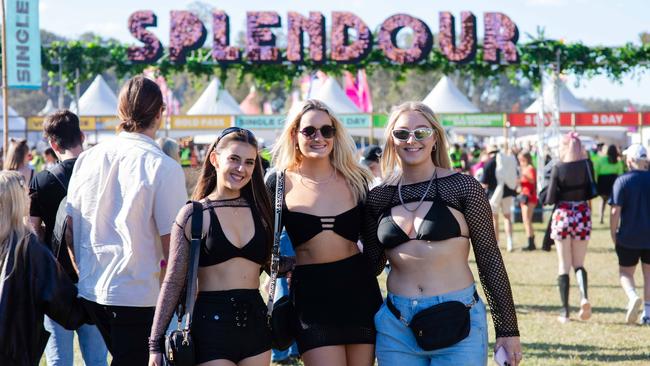
Ticket prices and logistical costs of festivals
A three-day ticket for Splendour 2024 was set at $399, down from $429 for the same pass in 2023. Camping tickets were also down to $159 this year from $185 last year.
It’s clear organisers were aware their target market maybe struggling financially in the cost of living crisis and were attempting to offer more bang for their buck, but if you add in the cost of flights, travel to and from the airport as well as alcohol and food, festivalgoers are outlaying at least $1,000 to attend. That is a figure that is beyond reach for many young Australians in the current economic climate.
Festivals rely on early interest, registrations and pre-sales to guarantee fees for artists, and Mr Rule said Splendour cancelling its 2024 edition before tickets even went on sale shows how dire the situation was.
“You see Splendour being cancelled. That festival with that support, it’s got the backing and promotion of Triple J, it’s got that history. Even it couldn’t get out of the gates,” Mr Rule told The Australian.
“It’s a line-in-the sand moment.”
The financial costs of moving large production crews and international talent from overseas into Australia is another significant factor in building a line-up, particularly for smaller festivals.
Data from booking agencies shows international travel has risen 50 per cent since the pandemic for Australians, which further complicates matters for event organisers attempting to bring in artists and the teams behind them.
Experts believe the total cost of putting on a festival has risen about 30 per cent since Covid, which include travel, security, policing and construction costs.
Greens MP Cate Faehrmann told NSW parliament late last year that police were “price gouging” music festivals, with the problem largely contained to her state.
She revealed NSW Police charged $107,852 for policing a 16,000-person event in NSW, while Victoria and Queensland Police charged $45,000 to patrol the same festival in each respective state.
The Australian Festival Association also revealed NSW Police charged $67,000 for another festival of 22,000, while Victoria Police only charged $7,500 for a crowd of 30,000.
“It is a police rort and it is killing music festivals in NSW,” Ms Faehrmann told parliament.
The world is still overcoming supply chain issues from the pandemic which sent construction costs skyrocketing, which has significantly impacted festivals and their abilities to build the stages and amenities needed.
Industry experts also blame rising insurance costs needed to cover festivals as another reason event organisers are hamstrung.
Lack of government support
Industry leaders say the government have been largely absent as the live music industry struggles through the post-Covid period and say even a small level of financial support would go a long way to securing its future.
A member of a major band who has headlined Splendour and other iconic festivals around the country and the world, who did not want to be named, said European countries had provided the blueprint for how to prop up the live music scene.
“We used to play big and small venues around Europe. The Netherlands, France, wherever – and it always surprised me how much they looked after everyone,” the artist told The Australian.
“They’d look after everyone, cater for all the crew and production team and nothing was ever an issue. If we’d play in front of tiny crowds, no one ever seemed to care. It always confused me, then I found out all these venues would be subsidised by the government if they undersold shows, so they never had to worry about how many people turned up and paid because they’d fill in the gaps.
“They were never stressed about small crowds. In the post-Covid world, we need a life-support system.”
Mr Rule, a prominent figure within Sydney’s music scene who has managed some of its biggest bands, said the government needs to be more involved, ensuring live venues survive and people can afford to attend shows.
“If we have governments supporting emerging live music, that’s a really big thing,” he said.
“If we can get venues pumping, with some subsidies for cheaper drinks or ticket prices, that’s where you’re going to get your next generation of loyal music fans who will follow their favourite bands to every festival.”
Difficulties building line-ups
The shift from selling physical singles and albums into streaming platforms has provided another obstacle for festival organisers.
With the vast majority of music consumption now through apps like Spotify, it has become harder to track the true size of an artist’s fanbase and whether that will translate to ticket sales.
Spotify, which boasts 31.7 per cent of music streaming subscribers worldwide, double that of second place Tancent Music, displays the monthly plays of artists within their respective channels and the overall play numbers of songs.
However, these figures can be inflated if songs are featured within popular playlists.
The emergence of TikTok for music has also muddied the waters, with songs becoming popular online because they trend in the background of influencers’ videos.

The impact of TikTok within the Australian music scene was most evident in the latest Triple J Hottest 100, which saw a number of the top 20 songs, including the countdown winner by Doja Cat, find fame through the social media platform. Industry insiders say while these songs may be popular online, they don’t always translate to ticket sales.
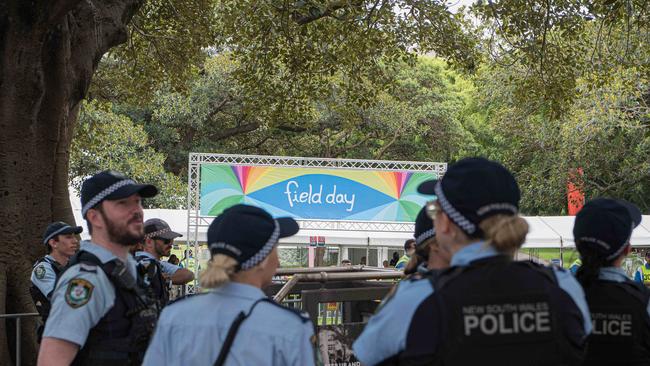
Culture of music
The last decade has seen the Australian music industry cop a series of hammer blows, from tighter government restrictions to widespread natural disasters and everything in between.
In 2014, the NSW instituted lockout laws following a series of violent incidents in Sydney’s Kings Cross in a move that sounded the death knell for many of the city’s most beloved pubs and clubs. Industry figures say the ripple effects are still being felt in today’s music industry.
“There were all these small venues around Australia, and you need those stepping stone venues,” another member of a major band told The Australian.
“If they don’t exist, we’re not harvesting bands worthy of slapping cash down for. We had the lockout laws, the death of Kings Cross, the death of Sydney’s night-life happened long enough ago now we start really feeling it.”
Mr Rule cited continuing distrust between festivalgoers and authorities.
“Over-policing festivals was the start of it. We had all those drug-related deaths around 2014, and the government’s tool back then was over-policing to stop festivals,” he said.
“Those people are now in their late 20s and 30s, maybe we’ve created that relationship of distrust.
“Now we have this process of people buying tickets and having them refunded due to cancellations, people are disgruntled. We had a few seasons of bushfires cancelling festivals, then got out of that and we had Covid. Then we got out of that and had all these free shows which probably in hindsight hurt the paying industry. Then we had this huge deluge over six months of heavy rain which cancelled festivals. I think people are exhausted.”
Splendour 2022 went viral for all the wrong reasons, when heavy rain turned large parts of the festival into a mud pit, with vehicles bogged and people unable to access stages. Day one was subsequently cancelled, but people who attended told The Australian it was one of the best festivals they had experienced and organisers had worked hard to keep everyone happy and safe.
“The complaints and pictures and videos and stuff on social media was largely bulls---t,” one attendee said.
“Anyone that was there will tell you the vibe of the place, everyone was smiling and having so much fun. People took the mud excuse and ran with it, but if you went you loved it. But perhaps that has put people off attending in the future.”
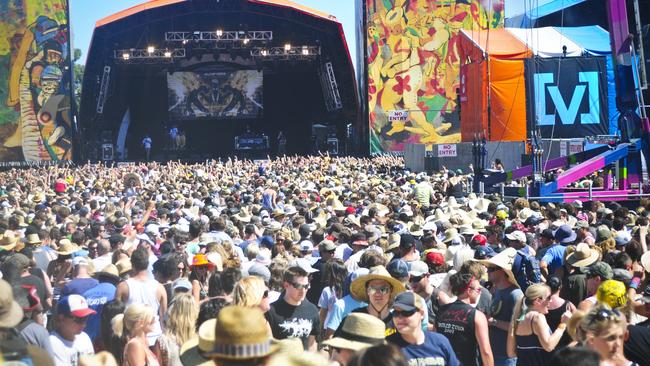
Social impacts of Covid
Health experts say the social impacts of the pandemic, particularly among young people, are still yet to be fully understood and music industry players believe that is leading to apprehension about attending festivals in general.
Insiders say it is hardly surprising people, who in their formative years were locked inside for two years and told to social distance, are now hesitant to go to major festivals with mosh pits and crowds of thousands of people.
“We have no idea the impact of this thing on kids. There’s no doubt Covid changed the way people want to be entertained,” Mr Rule told The Australian.
“People are used to being at home, watching Netflix. The thought of going out there, it’s going to rain, sleeping in a wet tent. That adventurous attitude I think has waned.
“The relationship with festivals has changed and we’ve lost a generation of young people.”
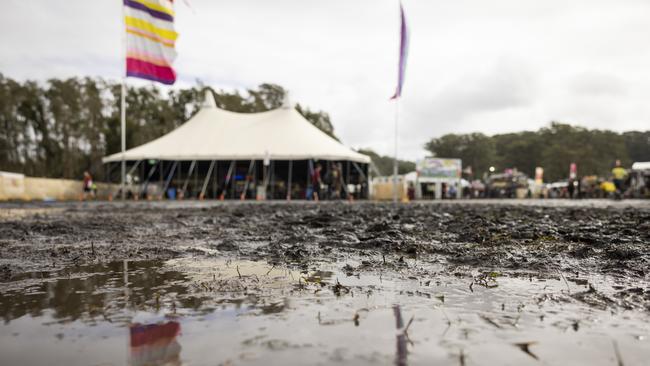
Where to from here?
Industry leaders say Australia is at a crossroads with the music festival scene and while there is hope that many of these cancelled festivals can return in the near future, changes are needed.
The Australian Festival Association, artists, producers and managers have all told this publication there needed to be greater involvement from the government to ensure the industry is structured properly and commercial radio stations had to prioritise Australian music.
“The industry canabalises itself. For this ‘we’re all in this together’ front you see, that’s not reality,” Mr Rule said.
“There has to be quotas on commercial radio stations in this country to build up Australian music. We need to find a way to all work together in a cohesive fashion so everyone benefits.”
Mr Wilson said all levels had a role to play in reviving the festival scene.
“The brand and the community I hope will be back and we can go to Groovin and Splendour in 12 months when these economic pressures have eased,” he said.
“I think everyone needs to pull in the same direction and help festivals out. The government, the industry, anyone who puts on these events, artists and promoters. We need to be working with each other to keep festivals afloat.
“Buy tickets early, government funding. I hope we can see these events all back next year.”



To join the conversation, please log in. Don't have an account? Register
Join the conversation, you are commenting as Logout